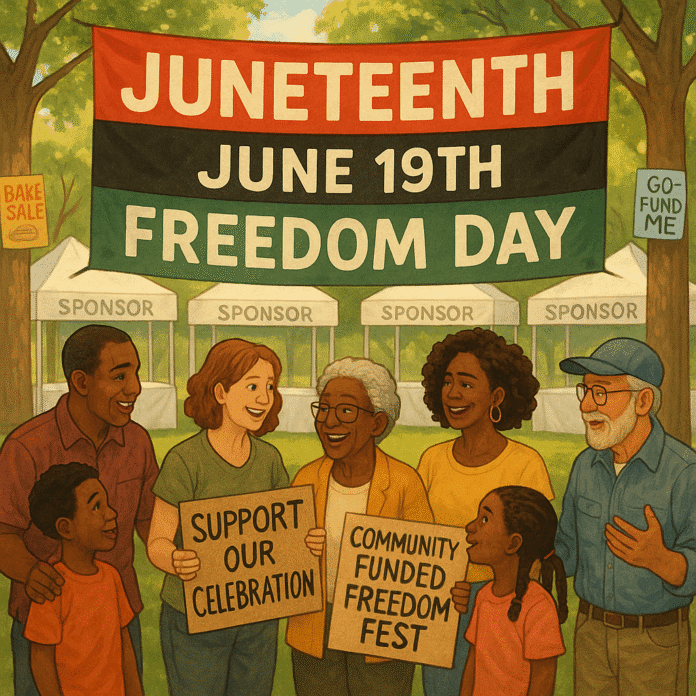Communities rally to honor freedom in the face of ongoing funding challenges
Juneteenth 2025 has become a striking example of resilience as communities across the nation adapt to significant funding cuts and shifting political priorities. Corporate sponsorships that once bolstered vibrant celebrations have dried up amid economic uncertainty and a political climate that targets diversity, equity, and inclusion programs. In many cities, organizers have been forced to scale back or even cancel traditional festivities. Yet, amid these setbacks, community leaders and activists are mobilizing creative fundraising methods and local partnerships to ensure that the historic spirit of emancipation endures.
The Changing Funding Landscape
Declining Corporate Sponsorships
For years, corporate support has been a cornerstone of robust Juneteenth celebrations. In 2025, however, many companies cited economic uncertainty as a reason to withdraw their sponsorship. This decline has had dramatic consequences for event organizers. In San Diego, for example, Marla Cooper’s family foundation encountered a critical shortfall when a$25,000 grant was rescinded. As Cooper explained, “That’s$25,000 we have to figure out how we’re going to pay for.” The loss of such a key funding source has forced organizers to explore alternative mechanisms including personal contributions and local business partnerships. The pattern is not isolated; cities across the nation report similar reductions that have led to downward adjustments in event size and scope.
Political Weather and Changes in DEI Programs
The funding crisis for Juneteenth in 2025 is intertwined with broader political developments. Republican-led initiatives aimed at ending diversity, equity, and inclusion (DEI) programs have had ripple effects beyond the corporate sphere. In West Virginia, for instance, the state’s historic observance of Juneteenth was canceled for the first time since 2017. Governor Patrick Morrisey’s administration cited budget deficits in combination with new policies that target DEI efforts as the rationale behind dismantling state-sponsored celebrations. In Colorado Springs, the Southern Colorado Juneteenth Festival experienced a steep decline in sponsorships and had to relocate due to cuts in municipal support. These political decisions have not only impacted funding but have also contributed to an atmosphere of uncertainty and concern among organizers and participants alike.
Community Resilience and Adaptation
Grassroots Fundraising and Local Initiatives
Despite the shock waves sent through the planning of Juneteenth celebrations, many communities are refusing to let adversity extinguish the spirit of the holiday. In Denver, where the Juneteenth Music Festival suffered a 60% drop in sponsorships resulting in an$80,000 funding gap, organizers responded by condensing the event from a two-day celebration to a single day. They simultaneously launched grassroots fundraising campaigns that tapped into local networks, crowdfunding platforms, and in-kind donations from community businesses. Such initiatives underscore the collective determination to celebrate freedom and honor the historical significance of Juneteenth despite external financial pressures.
Voices from the Frontlines
Marla Cooper’s resolute attitude resonates across the nation. Her words, “We will always have Juneteenth,” capture the commitment of countless organizers who prioritize community solidarity over financial backing. In Colorado Springs, festival planner Jennifer Smith noted, “Many of our long-time sponsors cited cuts in DEI-related budgets, but the community’s energy has encouraged us to reimagine our celebration.” Meanwhile, in politically volatile areas such as Bend, Oregon, the decision to cancel planned events has sparked vigorous public debate over the role of government funding and corporate influence in cultural celebrations. Organizers argue that preserving Juneteenth is not only a tribute to the past but a necessary step forward in the struggle for racial equity.
Implications and Future Outlook
Long-Term Impact on Cultural Celebrations
The funding challenges of 2025 reveal the vulnerability of cultural celebrations that rely heavily on external financial support. With corporate sponsorships and state funding in decline, the continuity of Juneteenth events hangs in a delicate balance. The impact extends beyond individual events; it raises broader questions about civic commitment to honoring historical milestones. This trend could have lasting consequences for how society values and preserves cultural heritage, particularly events that celebrate marginalized histories. The apparent retreat from financial support for DEI initiatives further indicates a shift in how political and economic forces intersect with cultural memory.
Steps for Future Sustainability
Looking ahead, organizers face the dual challenge of reimagining funding models and advocating for policies that uphold cultural celebrations as essential civic expressions. A multi-pronged approach is emerging that includes:
- Diversifying funding sources by leveraging crowdfunding, local business sponsorships, and private donations.
- Forming stronger partnerships with community-based organizations and cultural institutions to pool resources and share expertise.
- Engaging in policy advocacy aimed at securing public funds for events that commemorate critical moments of American history.
- Expanding the use of digital platforms to host virtual components of celebrations, thereby reducing costs while reaching a wider audience.
Each of these strategies is part of a broader effort to insulate Juneteenth events from sudden political or economic downturns and to ensure that the commemorations remain an inclusive space for honoring freedom and social justice.
A Call to Broader Civic Engagement
The financial obstacles confronting Juneteenth in 2025 serve as a reminder that safeguarding cultural celebrations requires active civic participation. Community efforts, from local fundraising initiatives to policy advocacy, are essential to ensure that the legacy of emancipation is not diminished by shifting external priorities. Public awareness and involvement are vital; every contribution, no matter how small, helps counterbalance the larger economic and political forces at play.
Juneteenth 2025 stands as a testament to community resilience in the face of corporate pullbacks and politically driven budget cuts. While the loss of corporate sponsors and state funding has posed significant challenges, local leaders and grassroots organizers have rallied together to reimagine and preserve the celebration of freedom. The determination encapsulated in statements like Marla Cooper’s “We will always have Juneteenth” underscores a broader commitment to ensure that this critical piece of American history endures.
The future of Juneteenth celebrations will depend on the ability of communities to diversify their support, harness the power of local networks, and advocate for policies that honor the spirit of freedom and equality. This is a call to action for anyone who believes in celebrating our shared history and the ongoing struggle for racial equity. Stand with your community, contribute where you can, and help ensure that Juneteenth continues to shine as a beacon of hope and remembrance for generations to come.




